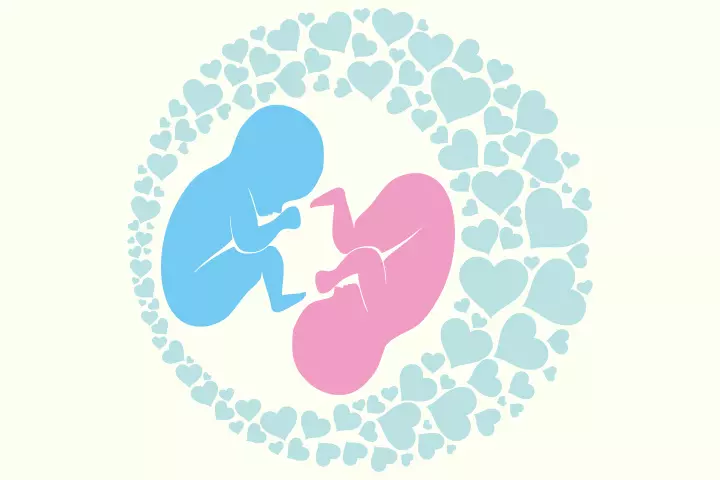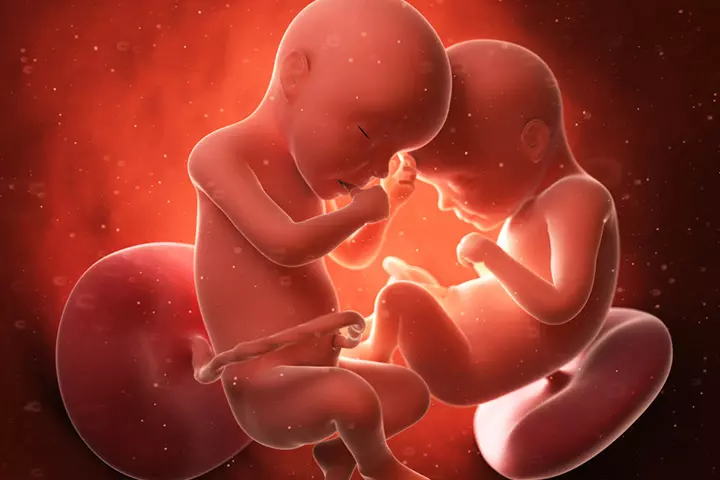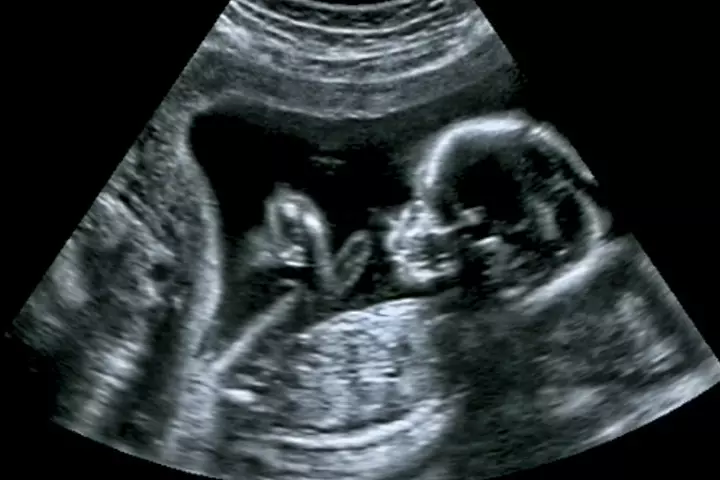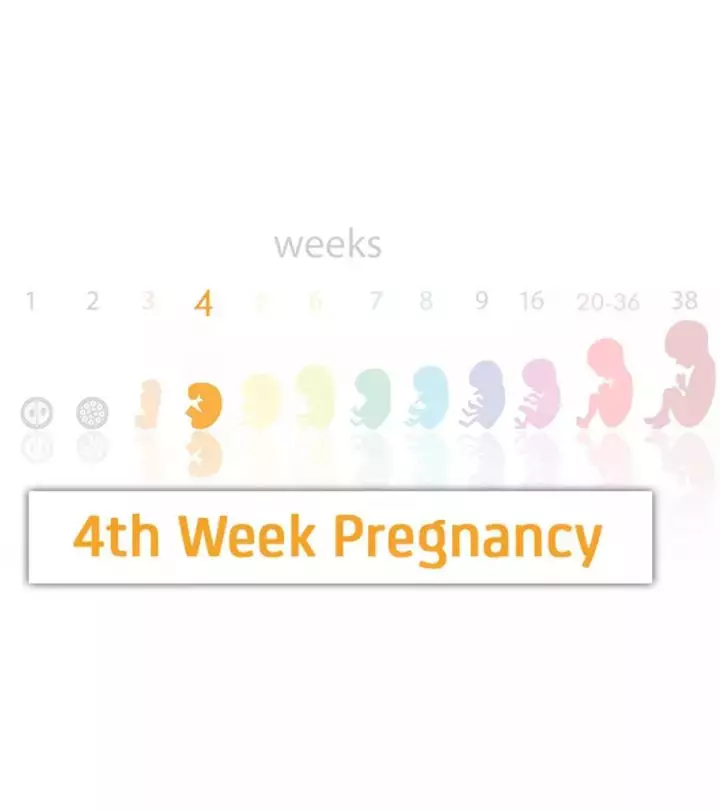
Image: Shutterstock
Conception and the embryo’s development into a full-grown baby is an extraordinary journey that every mother proudly embraces. But, while experiencing these events yourselves is blissful, reading some interesting pregnancy facts will spark some additional joy.
These facts are great to read if you are planning to conceive or pregnant. From the average pregnancy duration to how much the uterus can grow in size, these facts contain all the information a woman would love to read and explore about the expecting mothers and their unborn babies.
Read on as we share some interesting pregnancy facts with you and also debunk a few pregnancy and fertility myths in between.
Key Pointers
- You can start to bond with your baby from the 24th week.
- If your baby is not born on the due date, don’t panic. As just a small percentage of babies arrive on time.
- This post will also break the myths on eating for two and avoiding exercise during pregnancy.
Pregnancy Facts You Probably Didn’t Know Before
- The average duration of pregnancy is 280 days. But it can be longer too. In 1945, Beulah Hunter, a 25-year-old woman from Los Angeles, gave birth to a healthy baby girl after being pregnant for 375 days (1). It was the longest recorded pregnancy!
- During pregnancy, an actual organ called placenta is developed in the uterus. It helps to provide nutrients and oxygen to the fetus.
- After a couple of months of development, babies begin to pee in the womb. And sometimes they tend to swallow their own pee.
- During postpartum, your uterus can shrink back down to its normal size after growing up to 500 times during pregnancy. (2).
- During pregnancy, the fetus can send stem cells to the mother to repair any damage. It means your baby can heal you right from when it is in your womb (3).
- When the fetus is about six months old, it develops fingerprints and footprints. The ridges are formed in three patterns that are classified under whorls, loops, and arches. These are formed on palms, fingertips, and soles. Not many know that fingerprints help us grasp objects.
- The world’s heaviest baby was born in 1879 to Giantess Anna Bates. He weighed 22lb (9.98kg) and measured 28in (71.12cm). Unfortunately, he died after 11 hours.
- The world’s smallest baby! In December 2018, an infant born in San Diego, California, weighed just 8.6 ounces at birth. She was kept in the NICU for about five months and gained up to 5.6 pounds. She is now healthy.
- Women tend to experience some skin changes like brown patches on the face around the cheeks, nose, and forehead, dark line from the navel to the pubic area, stretch marks, acne etc., during their pregnancy. This mainly occurs due to hormonal changes, however, it will fade away after childbirth (4).

- Babies usually develop teeth during their first year. But did you know that one in 2000 infants are born with teeth? These are termed as natal teeth. Nonetheless, doctors might remove them as they may cause certain problems such as injury to the tongue, the infant biting the mother during breastfeeding, or the baby may be inhaling the tooth (5).
- Foot size increases! After giving birth to your baby, you may notice your foot size to be one inch bigger. That is because of certain hormones that relax your ligaments. This change is usually more permanent when you grow old (6).
- Your baby can hear in the womb and respond to the sounds coming from outside. By the end of the 24th week, the fetus can actively listen to you. This is the right time to bond and communicate with your baby (7).
- Pregnancy can give you a super sense of smell! Now you know that you are not imagining things, and what you are smelling is right.
 Did you know?
Did you know?
- Although many old wives’ tales are just myths, there are a few that are valid. One such theory is that pregnant women suffering from severe heartburn could give birth to babies with hair (9).
- A new mother could experience forgetfulness quite often. This is called ‘mommy brain,’ which is common among most women. So yes, you are not the only one forgetting things during pregnancy.
- Craving food during pregnancy is normal. But some women also develop cravings for non-food items such as paper or hair, and this weird but real condition is called Pica! In a comprehensive meta-analysis, researchers from multiple institutions discovered that Pica affects approximately 34% of the global population.

- Nursing mothers start leaking milk from their breast when they hear babies cry. It is said that oxytociniHormone released by the hypothalamus in the brain that aids in uterine contraction and lactation is released in the blood when a woman hears a cry, and that causes milk let-down.
- Igbo-ora, a town in Nigeria, has the highest number of twin births, because of which it is called the land of twins.

- During pregnancy, the blood volume increases by 50%, to meet the increased blood flow requirement for the baby and you (10).
- The milk ducts are completely developed during the second trimester of pregnancy. Your breasts may feel big but the milk does not come out till delivery .
- Is your husband experiencing any pregnancy symptoms such as cravings, morning sickness, and anxiety? Well, it is a real condition referred to as couvade syndrome or sympathetic pregnancy.

- In Ancient Egypt, it was believed that if a pregnant woman peed on barley and wheat and if they sprouted, pregnancy was confirmed. It was also said that if barley grew, it would be a boy, and if wheat sprouted, then it would be a girl.
- Heard of pregnancy glow? That’s real! As the blood volume increases during pregnancy, and there is increased estrogen hormone, pregnant women will have glowing skin and shiny hair.
- Your fetus will develop taste buds during 13-14 week. This is the time when your baby can taste some strong and pungent flavors.

- Sweating and more sweating! As the blood volume increases when you are pregnant, your body temperature increases. Your body starts sweating more to cool you down.
- You might notice a change in your voice when you are pregnant. That is because your vocal cords may get swollen, altering your tone.
- Twin pregnancy fact! Twins start bonding with each other right from when they are in the womb. Every twin set is different, but they do share a special bond.
 Did you know?
Did you know?
- Women produce more estrogen in one pregnancy than non-pregnant women can in their entire life!
- Morning sickness is not limited to the mornings. It can be experienced during afternoons and evenings too. Seeking regular prenatal care can help alleviate these symptoms.
- Besides nourishing the fetus, the placenta can protect your little one from infections too by transferring protective antibodies from your body to your fetus.
- Your baby could be dreaming in the womb. Scientists have observed rapid eye movement of the fetus when it is in the womb, and believe it is due to dreaming.

- Hormonal changes during pregnancy could affect your vision. But there is nothing to worry about, as it is a temporary condition.
- It has been scientifically proven that nipple stimulation can induce labor naturally. This technique releases oxytocin from your body, which triggers contractions.
- In around five months of gestation, the fetus will develop soft and fine hair referred to as lanugo. It usually sheds away in the following months, but some babies are born with it.

- Only 3 to 5% of the babies are born on the due date. So if you are running late, do not panic.
- Pseudocyesis is a term given for false pregnancy. It causes many pregnancy symptoms, but the woman is not pregnant. Strange, right?
- You might poop during labor. This is a common occurrence and not something you should be embarrassed about.
- You might experience minor gum and nose bleeding while pregnant.
- Your baby when born has more bones than you. However, some bones fuse while the baby is growing up.
- Babies repeatedly yawn in the womb (12).

- Your baby first passes poop in the womb, early on in pregnancy (13).
- You would be delighted to know what all babies can do in the womb. Many ultrasounds have detected the fetuses clapping hands, smiling and making expressions, and sucking their thumbs in the womb (14).
 Research finds
Research finds- Orgasms could induce labor some times during late pregnancy (16).
- Do you get weird dreams? Pregnant women commonly get vivid and strong dreams, which are usually frightening. Talking about the dream with someone can help you take it off your mind (17).
- Pregnancy could bring changes in the mother’s brain too (18).
You must have come across a lot of myths while you are pregnant. Some common ones are debunked here:
- Myth: Your belly shape/size reveals the gender of the baby.
Fact: The shape or size of the pregnant belly has nothing to say about your baby’s gender. So, if someone tells you that you would deliver a girl or a boy just by looking at your belly, do not believe it.
- Myth: Eating papaya during pregnancy can cause miscarriage.
Fact: Maternal health should not be negatively impacted by consuming fully ripe papaya. However, the presence of latex in unripe or semi-ripe papaya may cause uterine contractions (19).
- Myth: It is dangerous to exercise during pregnancy.
Fact: Not every pregnant woman is at risk due to exercise. So it is better to consult your doctor before doing so and do it under the guidance of an expert trainer.
- Myth: Eat for two when you are pregnant.
Fact: You do not have to eat for two while you are pregnant. Although your nutrition should improve, you will need only 300 calories extra during pregnancy.
- Myth: Pregnant women should not drink coffee.
Fact: According to the American College of Obstetricians and Gynaecologists, consuming less than 200mg caffeine is not harmful in pregnancy (20).
Frequently Asked Questions
1. What are the facts about early pregnancy?
One of the unique facts about early pregnancy is that nausea and vomiting during early pregnancy can be good and healthy signs of pregnancy (21).
2. Which pregnancy is the riskiest?
Geriatric pregnancy, pregnancy after 35 years of age, is considered a high-risk pregnancy since it has the highest risk of maternal and fetal complications, including gestational diabetes, preeclampsiaiA pregnancy condition concerning high blood pressure and protein in the urine , and chromosomeiLong, thread-like structures in the nucleus of a cell that carry an organism's genetic material (DNA) abnormalities in babies (22).
3. What’s the easiest month of pregnancy?
For most women, the second trimester is often easier than the other trimesters, likely due to the reduced symptoms of nausea and fatigue (22). However, it’s important to remember that every pregnancy is unique, so there may not be a universal easiest pregnancy month as such.
4. What is the average age of first pregnancy?
The average age of first pregnancy has increased from 24.6 to 27.2 years over the past three decades (23).
5. Which trimester is the highest risk of miscarriage?
Although pregnancy loss may happen anytime due to external factors and medical conditions, the first trimester, particularly the first 12 weeks of pregnancy, has the highest risk of miscarriage. Around eighty percent of miscarriages occur during this time (24).
6. Can I still get my period while pregnant?
No, it is not possible to experience a regular menstrual cycle when pregnant (25). However, some pregnant women may experience vaginal bleeding due to intercourse, implantation, or underlying complications that should be discussed with a healthcare professional (26).
7. Is it true that I can’t dye my hair during pregnancy?
It is normally safe to dye your hair during pregnancy, but proper care should be taken, such as avoiding harsh chemicals and ensuring proper ventilation in the room (27).
8. Can having sex during pregnancy harm the baby?
Having sex while pregnant is generally safe and does not harm the baby as the penetration does not go beyond the vagina (28).
9. Is it true that pregnant women should avoid cats because of the risk of toxoplasmosis?
Yes, pregnant women should be cautious around cats due to the risk of toxoplasmosis. Precautions include avoiding cat feces or wearing gloves and keeping the sandboxes covered to avoid contact with Toxoplasma bacteria present in their feces (29).
10. Can we determine the gender of the baby based on the mother’s cravings?
No, cravings during pregnancy cannot reliably predict the gender of the baby. They are mainly tied to hormonal changes and dietary requirements rather than the baby’s gender (30).
The plethora of information that is available online regarding what happens during pregnancy can be overwhelming, and it may be difficult to distinguish facts from myths. These things to know about pregnancy can leave you in awe. Knowing other people also experience the same may help you gain strength when you experience any complications. Rather than trusting unverified information from individuals or what you read on the internet, you should trust facts.
Infographic: Notable Facts About Pregnancy
While you’re anticipating holding your baby in your hands, the nine months of pregnancy will be full of surprises. Check out the infographic below to learn about some amazing and interesting facts about pregnancy.

Illustration: Momjunction Design Team
Illustration: Surprising Pregnancy Facts & Myths Every Woman Should Know

Image: Stable Diffusion/MomJunction Design Team
Watch this amazing video to learn about the stages of pregnancy and how your baby grows! Get ready to be amazed by the incredible journey of your baby!
References
1. The Amazing Longest Human Pregnancy; New health Guide
2. Wonder within wonder; University of Pennsylvania
3. G. S. Dawe, X. W. Tan, and Z Ciao; Cell Migration from Baby to Mother; Cell Adhesion and Migration (2007)
4. Skin conditions during pregnancy; The American College of Obstetricians & Gynaecologists (2018)
5. Natal teeth; Stanford Children’s Health
6. Why your feet get bigger as you age; Harvard Medical School
7. Pregnancy at Week 24; Pregnancy, Birth and Baby
8. E. Leslie Cameron; Pregnancy and olfaction: a review; Frontiers in Psychology
9. K. Costigan, H. L. Sipsma, and J. A. Dipietro; Pregnancy folklore revisited: the case of heartburn and hair; Birth Issues in Perinatal Care (2006)
10. F. Hytten; Blood volume changes in normal pregnancy; Clinics in haematology (1985)
11. Study by LIJ obstetrician confirms taller women are more likely to have twins; The American Association for the Advancement of Science (AAAS)
12. N. Greenfieldboyce; When fetuses yawn in the womb; npr.org (2012)
13. Meconium Aspiration; Health Encyclopedia: University of Rochester Medical Center
14. M. Michelson; Confessions of prenatal ultrasound techs; Akron Children’s Hopsital (2022)
15. J L Gingras, et al.; Fetal homologue of infant crying; (2005)
16. Josephine Kavanagh; Sexual intercourse for cervical ripening and induction of labour; Cochrane Library
17. Strange dreams and nightmare; Health Education and Training
18. Pregnancy may change mom’s brain for years afterward; Duke Initiative for Science & Society
19. Moderate caffeine consumption during pregnancy; Obstetrics and Gynaecology (2010)/cite>
20. A. Adebiyi, P. G. Adaikan, and R. N. Prasad; Papaya (Carica papaya) consumption is unsafe in pregnancy: fact or fable? Scientific evaluation of a common belief in some parts of Asia using a rat model; The British Journal of Nutrition (2002)
21. Francis Collins; Morning Sickness Associated with Lower Miscarriage Risk; NIH
22. Stages of pregnancy; Office on Women’s Health
23. American Women Are Waiting to Begin Families; Centers for Disease Control and Prevention
24. Miscarriage; March of Dimes
25. If you get your period, does that mean you’re not pregnant?; Planned Parenthood
26. Bleeding During Early Pregnancy; Nationwide Children’s
27. Is it safe to use hair dye when I’m pregnant or breastfeeding?; NHS
28. Sex in pregnancy; NHS
29. About Toxoplasmosis; Centers for Disease Control and Prevention
30. Gender, positions and cravings in pregnancy: truth or myth; NCT
Community Experiences
Join the conversation and become a part of our nurturing community! Share your stories, experiences, and insights to connect with fellow parents.
Read full bio of Dr. Anita Gupta
Read full bio of Ghazia Shah
Read full bio of Rebecca Malachi
Read full bio of Reshmi Das



















